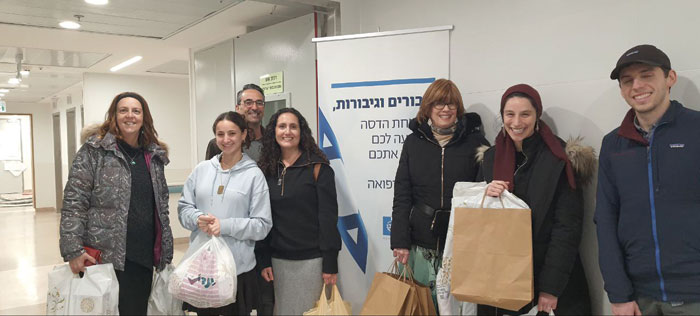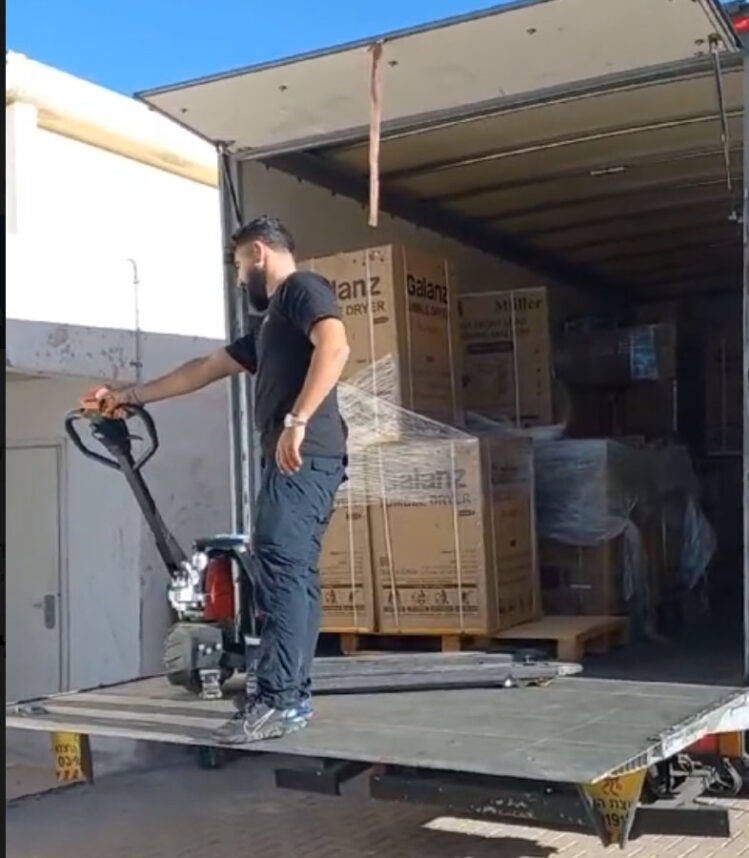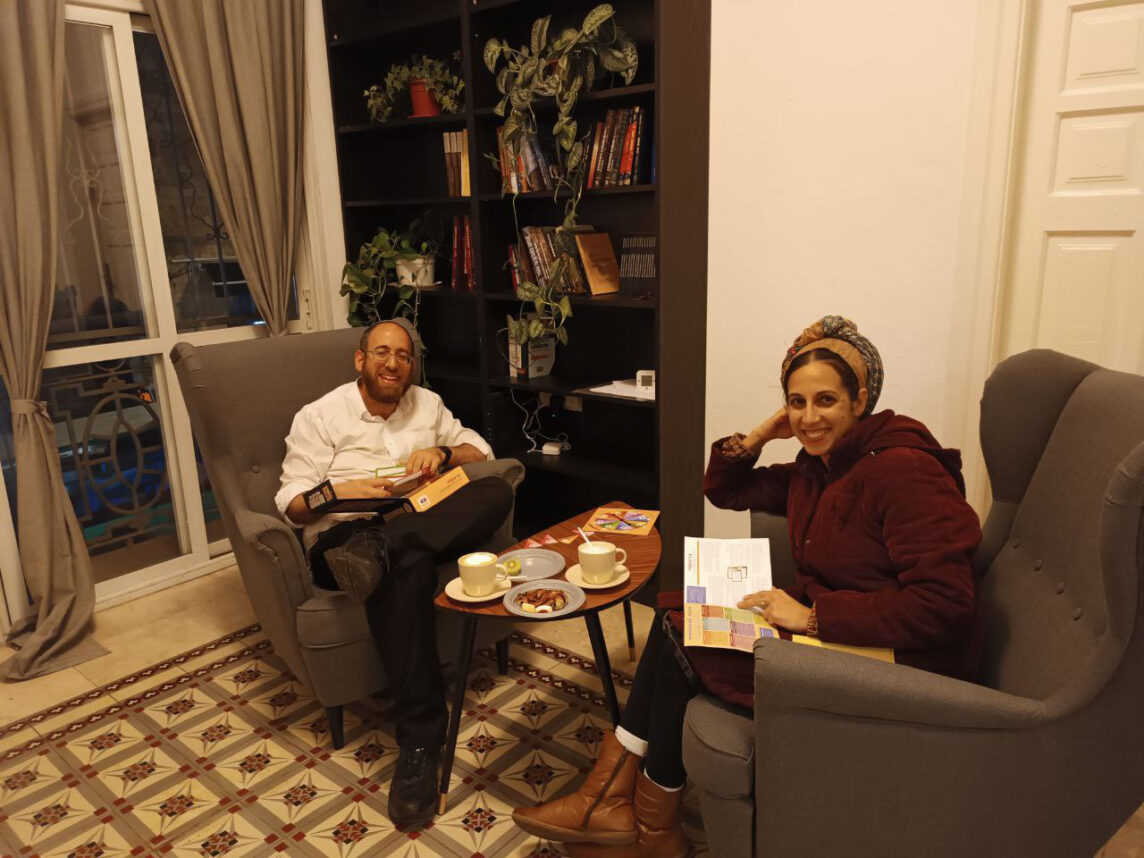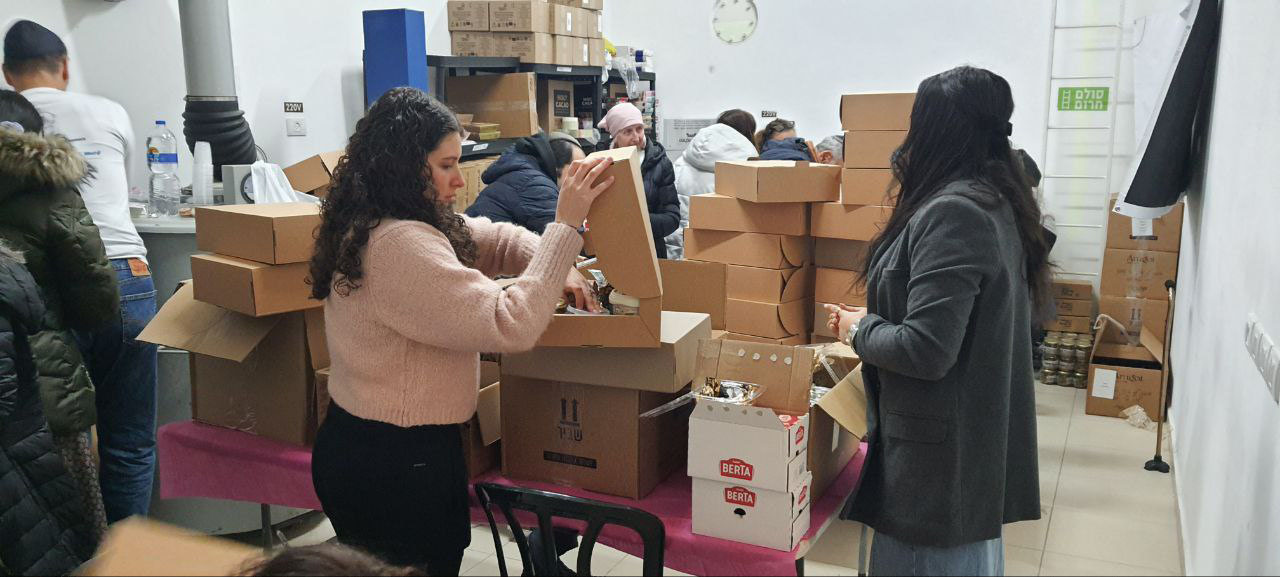 Aharoni and a group of volunteers delivering board games to wounded soldiers at Hadassah Hospital
Aharoni and a group of volunteers delivering board games to wounded soldiers at Hadassah Hospital When Russia invaded Ukraine on Feb. 22, 2022, Leah Zakh Aharoni immediately suspended her work as a business consultant in Israel. Born in the former Soviet Union and having led multiple groups on trips to Hassidic sites in Ukraine, Leah had a keen understanding of the territory, the Jewish communities and the geopolitics. Working with Agudath Israel of America and its Vaad Hatzalah for Ukrainian Jewry, Leah helped set up a system to provide food to Ukrainian refugees throughout Europe and a support center for new immigrants in Israel.
These efforts blossomed into the nonprofit organization she created, Our People, to help new immigrants from the former Soviet Union transition to life in Israel. In just one year, Our People assisted and advised more than 1,000 families, ran four summer camp programs with over 400 participants, and ran a non-profit accelerator for 15 Russian-speaking community initiatives in Israel and Europe, among other endeavors.
Leah immigrated to the U.S. with her family at age 12 and grew up in Riverdale, New York. After graduating high school in 1993, she made aliyah by herself. As a young mother wanting to work from home, she started a translation business at the age of 25, which she ran for 15 years. After earning a Master’s degree in Organizational Psychology, she began helping other women start and grow their own businesses. For 10 years she taught and consulted with hundreds of companies and organizations on marketing, organizational development and finances, but the twin tragedies of the war in Ukraine and the Hamas attack on Israel pushed Leah to apply her organization-building skills to the world of charitable assistance to victims of wars.
Leah has long been alert to the needs of the Jewish people, both urgent and day-to-day. For example, a few years ago she spearheaded an effort to train writers in the art of opinion and public relations to help boost Israel-friendly media messaging. After Oct. 7, she recruited writers and editors to curate a daily news digest of the war, called the Israel Media Room. At Leah’s request I gladly volunteered in both projects.
”This is my guiding light. We do what we can to preserve our people’s humanity in this very hard situation.”
– Leah Zakh Aharoni
Since Oct. 7, Our People has been providing tactical and personal equipment for IDF soldiers, food, and dozens of washing machines for hotels housing displaced families. Increasingly, though, Leah’s eye is trained on easing the emotional burdens carried by thousands of Israelis. She explains, “In the early days of the Ukraine war I went to get my nails done. A Jewish-Ukrainian psychologist displaced by the war was doing my nails. She shared her story of bombings and escape. When her family arrived at the Chabad refugee center in Romania, she found flowers on each table in the dining room. Those flowers made her cry for the first time during the war. This is my guiding light. We do what we can to preserve our people’s humanity in this very hard situation.”

Leah realized that her work helping Russian-Ukrainian Jews in 2022-2023 was a training ground for what she is doing now. “Having worked directly with displaced war victims, we gained many insights about what would be needed in this war. I knew what was coming before it came.”
Many needs weren’t immediately apparent. For example, a number of families who were not evacuated officially but needed to leave danger zones such as Ashkelon and Netivot had American holiday apartments found for them in Jerusalem. The apartments were beautiful, but the families had no way to make a living. Our People raised funds for more than 7,000 food boxes and 1,000 food vouchers, distributing 400,000 pounds of food in six weeks. Much of the funding came from an American nonprofit.
Jewish organizations that focused on relief efforts quickly realized that this war would be long, its horrors creating the biggest mental health crisis in Israel’s history. “For children off school, not living at home, and many with fathers deployed, injured, or killed, toys were as important as food,” Leah said. “The right games can keep kids from hanging out on the streets.” So far, Our People has distributed more than 1,200 toys and games. Now she is trying to identify other ways to help Israelis “finish the war a bit less traumatized. All our programs today are to find creative ways for people to feel just a little bit better.”
Living in a hotel is also disruptive to families, breaking down family structure and erasing personal space. Couples have no privacy. Friction easily flares. To try to ameliorate the stress, Leah established the Shalom Bayit café, open three times a week, where couples can reserve space for a date night in a space furnished with comfortable chairs, coffee and cake. Couples can get away from the kids, talk, play “couple card games” donated by psychologists and otherwise find their way back to healthy emotional connections. “This has been one of the most endearing efforts,” Leah said. “You don’t think of date night as something needed in a time of war.”

Many of the initiatives seem small but pay big dividends. Leah brought a huge donation of yarn from U.S.-based knitting circles to Russian grandmothers in Jerusalem. Eager for something to do to help the war effort, they began knitting hats for soldiers. Women who immerse in the mikveh each month but come home to an empty bed because their husbands are deployed are given beautifully wrapped gift packages tied with ribbon, containing self-care products and make-up. These await the women in mikvehs throughout Israel and have been hugely popular. One Israeli company has provided products at a 90% discount. “In every gift we distribute, whether a cosmetics bag, a game for children or box of food, there is a handwritten note from a volunteer. When people realize that someone else took the time to think of them, it is very meaningful.”
Often, a program blossoms from an offer of help. “One day, the Begin Center in Jerusalem offered us their facility to hold a bat mitzvah for displaced girls. We jumped at the opportunity and held a beautiful group bat mitzvah event for 20 young women. But we had so many more requests. Kids dream of their bar or bat mitzvah for years, but being stuck in a hotel, their parents can’t even think of throwing a party. Since then, we’ve held six events for close to 100 children – everything you would do for your own kids – new clothes, arts and crafts workshops, music, dancing, gifts.” At one of the events, a mother came up to Leah in tears. Hailing from Sderot, she hid her kids (including her bar mitzvah boy) in a closet as Hamas terrorists slaughtered their next-door neighbor. “Just like during the Holocaust,” she said. The boy had been stuttering ever since. Being celebrated and picked up on someone’s shoulders was the first time the boy broke out of his shell since the start of the war. Leah is now planning to run a summer-long camp program for war-affected children. “For the past two years we have run extremely popular and well-received sleepaway and day camps for Jewish refugee kids from Russia and Ukraine. We now want to give the same opportunity to the kids traumatized by this war.”
Ourpeople.org has two packing facilities, one of which is a bomb center, and 90% of donations come from the U.S. “Israelis are shocked at how many Americans come to volunteer,” Leah said. “Just their presence is a huge boost to morale.” Still, she said there’s often a huge mismatch between where volunteers are placed versus where they are needed and best utilized. Leah and her team offer both financial and logistical support to half-a-dozen other aid organizations, helping them maximize their usefulness.

The success and reach of Our People have been “beyond our wildest dreams and plans,” Leah said, having raised and distributed more than $850,000 since the start of the war. “It’s as if Our People is one big shopping cart that we walk around with in the supermarket of life. Since day one we have identified ongoing needs, thought about how to fulfill them, and then someone taps us on the shoulder and offers us the resources necessary.”
To donate, go to www.ourpeople.org.il/wareffort.
Judy Gruen is the author of “Bylines and Blessings,” “The Skeptic and the Rabbi,” and other books.























 More news and opinions than at a Shabbat dinner, right in your inbox.
More news and opinions than at a Shabbat dinner, right in your inbox.